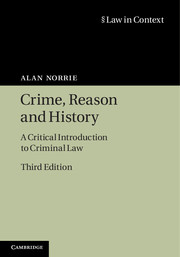Book contents
- Frontmatter
- Dedication
- Contents
- Preface to the third edition
- Preface to the second edition
- Preface to the first edition
- Table of cases
- Table of statutes
- Prologue: A brief history of the ancient juridical city of Fictionopolis
- Part I Context
- Part II Mens rea
- Part III Actus reus
- 6 Acts and omissions
- 7 Causation
- Part IV Defences
- Part V Concluding
- Bibliography
- Index
7 - Causation
Published online by Cambridge University Press: 05 October 2014
- Frontmatter
- Dedication
- Contents
- Preface to the third edition
- Preface to the second edition
- Preface to the first edition
- Table of cases
- Table of statutes
- Prologue: A brief history of the ancient juridical city of Fictionopolis
- Part I Context
- Part II Mens rea
- Part III Actus reus
- 6 Acts and omissions
- 7 Causation
- Part IV Defences
- Part V Concluding
- Bibliography
- Index
Summary
[H]itherto the judges have made little progress in establishing [the] principles [of imputation].
(Williams, 1983, 382)[T]he principles [of causation] to be found in the common law … are reasonably well settled and can be stated quite shortly.
(The Law Commission, 1989, 188)It is trite law … that the meaning of causation is heavily context-specific and that Parliament (or in some cases the courts) may apply different legal rules in different situations.
(Lords Hughes and Toulson, Hughes (2013) at [20])Introduction
A central feature of actus reus is that the accused’s act or omission must have caused a result which is the object of a criminal charge. At one level the issue is the relatively straightforward one of whether an act or omission is in fact causally connected with a result (White (1910)), but there remains the further question as to whether or not the one will be imputed as a cause of the other in law. Thus, under the old rule in murder that death must ensue within a year and a day of an assault, an assault outwith that period could be the factual cause of death, but not its legal cause (Dyson (1908)). That rule was abolished by the Law Reform (Year and a Day Rule) Act 1996, but where an injury resulting in death occurred more than three years previously, the Attorney General must now agree to a prosecution. This substitutes administrative discretion for legal rule but still indicates there are non-factual considerations relevant to the constitution of legal cause. The distinction between cause in fact and in law can be expressed using a variety of terms:
The but for cause is sometimes referred to as the factual cause, or the de facto cause, or the scientific cause. The important thing is to distinguish it from cause in another sense, the ‘imputable’ (or ‘legal’ or ‘effective’ or ‘direct’ or ‘proximate’) cause.
(Williams, 1983, 381)- Type
- Chapter
- Information
- Crime, Reason and HistoryA Critical Introduction to Criminal Law, pp. 171 - 196Publisher: Cambridge University PressPrint publication year: 2014



